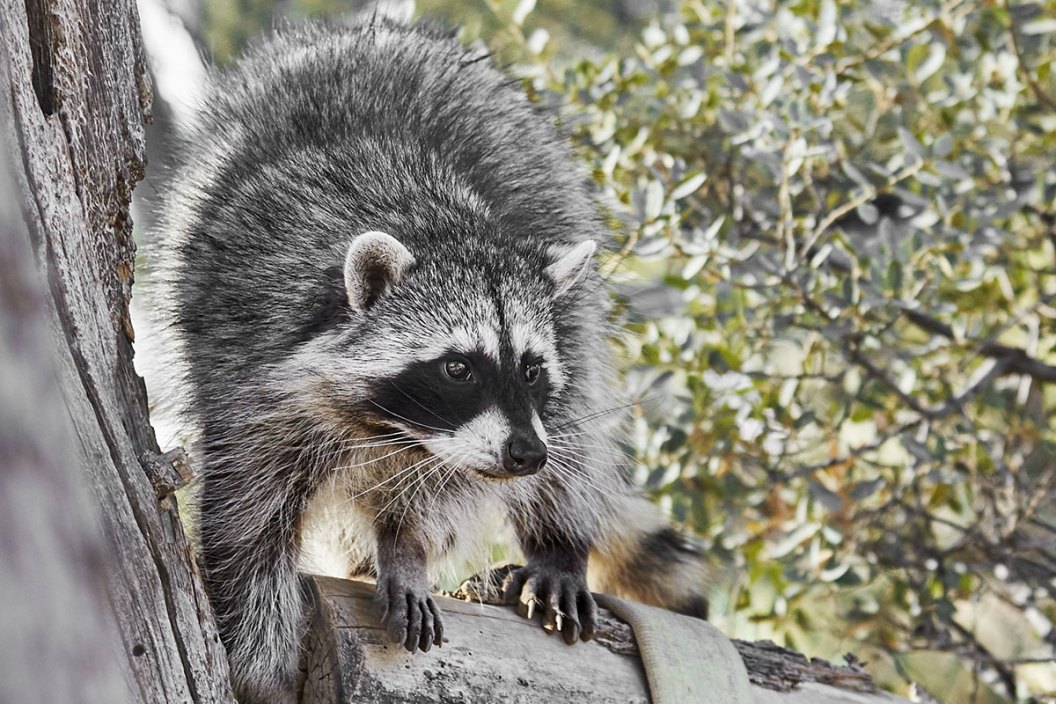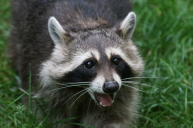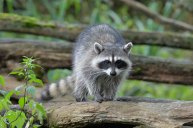Poop, scat, feces— no matter what you call it, animal waste is everywhere outdoors. Some excrement may be harmless, and some may carry disease. Knowing how to identify which animal waste is which can potentially keep you safe from germs and illness.
Raccoon scat is something in particular to watch out for, both on hikes and in your own backyard. Raccoons are a wild animal whose waste can carry a host of bacteria and parasites, including roundworm (Baylisascaris procyonis) and leptospirosis. That nasty stuff can infect not only humans but pets as well.
Raccoons are omnivores, which adds a bit of variation to the equation because it means raccoon poop can look very different depending on what the critters were consuming.
How to Identify Raccoon Scat
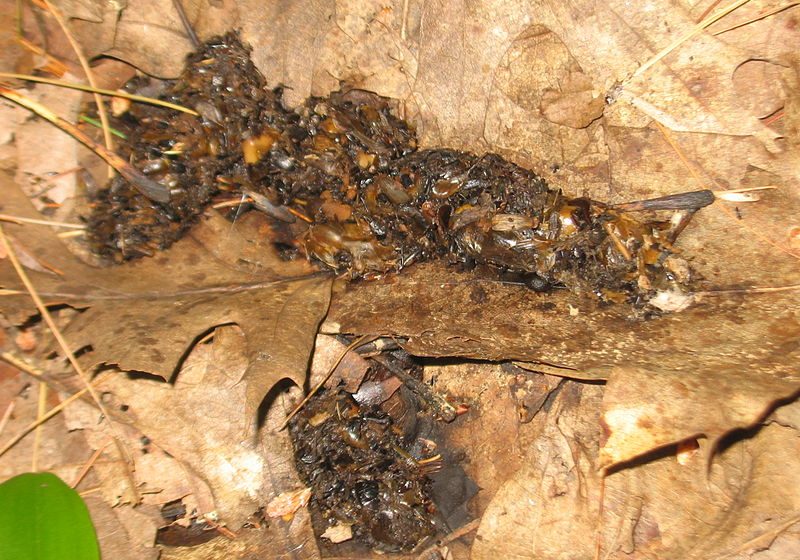
Wikimedia Commons, Jomegat
Odds are you've seen raccoon feces before, even though you probably didn't even realize what you were looking at. Most raccoon droppings are tubular in shape and can get up to around 3 inches—in this form, you may confuse it with dog droppings. It can also be quite clumpy in appearance and sticky in texture. It's coloring is typically a dark-black color, but it can also appear brown.
Raccoons are not picky eaters, so their poop is often found full of undigested food—little pieces of crayfish, berries or stuff they scavenged from human discards, such as dumpsters or trash cans. They love a stinky dinner from garbage cans! Human food scraps and bits of wrappers sometimes give the animal droppings a speckled appearance.
Where You'll Find Raccoon Scat
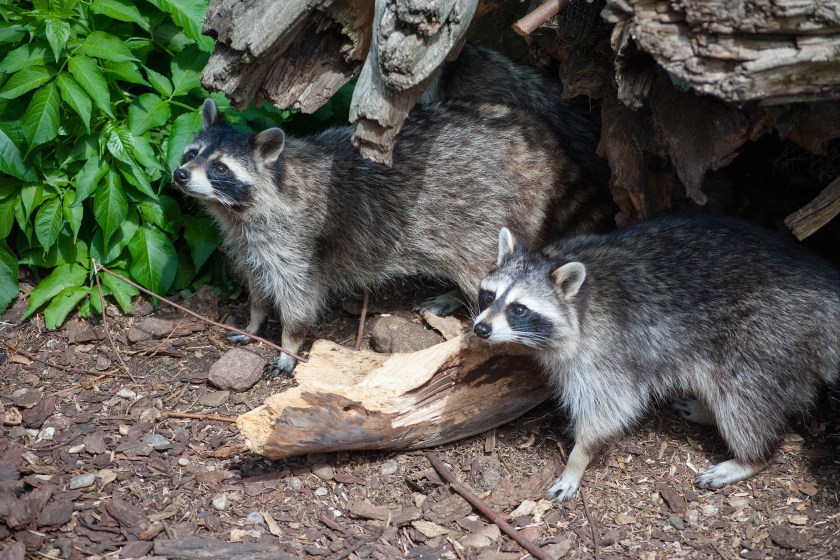
Getty Images, cotuvokne
When comparing raccoon poop to other types of animal feces, it can be some of the nastiest you can stumble across in the woods. And where you find one pile of it, there's likely to be more: Raccoons effectively designate certain areas as public restrooms, which biologists call "raccoon latrines."
In the wild, latrine sites are usually on logs, stumps, and rocks, which is why you should always be careful where you sit when taking a break while hiking. However, raccoons also sometimes leave droppings at the bases and crotches of trees.
Every so often, raccoons will use human habitation areas as a toilet, most commonly crawl spaces, woodpiles, haylofts, decks, roofs, or your kid's swing set.
Take caution when outdoors, especially when touching anything that could have served as a raccoon latrine area.
Why is Raccoon Scat Dangerous?
Raccoon poop is disgusting, but there's more to the issue than that. It's also full of awful threats to your health. The biggest concern is raccoon roundworm, an intestinal parasite otherwise known as Baylisascaris procyonis, as roundworm eggs are transmitted through feces quite regularly.
The eggs have to be ingested orally to be passed, so you might be thinking: "Who is going to eat raccoon poop?" Well, no one does it intentionally. The biggest group at risk here is small children, according to the Centers for Disease Control (CDC). Imagine a raccoon defecating in a small child's sandbox or on the swing set. If the child unknowingly touches the stuff or soil that has been contaminated by an infected raccoon and then puts their fingers in their mouth, they could get the roundworm.
Pets are another high-risk group for raccoon scat ingestion. While kids may do it inadvertently, dogs will sometimes just straight-up eat poop they find outside.
Raccoon roundworm infections are rare, but that doesn't mean you should let your guard down regarding raccoons in your yard or on your hikes. The diseases they carry can cause countless health issues including central nervous system disorders, vision loss, and even death in extreme cases. Who knew that raccoon droppings could cause so many health issues? Oh, and it's not just poop. Raccoon urine can carry some of these diseases, too.
How Do You Keep Raccoons Away?

Getty Images, Tim Pennington
The easiest way to keep raccoons out of your yard is to make your space unappealing to them. Find a way to secure your trash cans overnight, maybe by locking them up in the garage. If that's not an option, look at wildlife-proof trash cans. Don't leave any pet food outside overnight.
If you have a garden, fence it; you don't want them (or any other animals) raiding your vegetables anyway. Board up any crawl spaces or other areas where raccoons might decide to build a den, such as underneath a porch. If you have a barn, shed, or other structure on your property, make sure it is adequately sealed against wildlife.
If you find scat from a raccoon on your property, clean it up wearing disposable gloves, rubber boots, and other protective equipment. It's a good idea to wear a respirator when handling raccoon scat. Put the scat in a plastic bag to seal it before discarding it. Afterward, hit the area with hot, soapy water. The CDC says most household disinfectants will not kill the eggs or larvae of roundworm, but heat will. For outdoor spaces, the CDC recommends using boiling water or a propane torch.
There are also plenty of wild animal-deterring chemicals available at almost any Lowe's or Home Depot that will push those critters out of your yard and back into the wild. We've also heard of home remedies such as spraying vinegar, dish soap, and ammonia around the yard. Another method involves making a deterrent spray from cayenne pepper and water, which is a helpful way to protect your vegetable garden without spraying a bunch of chemicals everywhere. The raccoons and other foragers won't appreciate the spicy taste.
In the end, if those methods don't work, it might be time to call in the wildlife control professionals. They can come in to perform a raccoon removal on stubborn pests leaving poop all over your property.
READ MORE: What to Do if You Find a Fawn On Your Land
